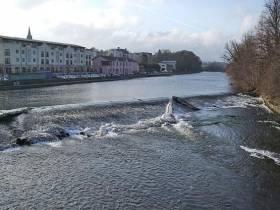Displaying items by tag: Munster Blackwater
A Cork fisherman has been found guilty of three breaches of fisheries legislation for illegal netting.
Paul O’Connell of Youghal, Co Cork had fixed a 336m net close to the mouth of the Munster Blackwater which was detected by a fisheries officer in the early hours of 4 July 2022.
O’Connell was convicted at Youghal District Court on Wednesday 12 April this year.
An operation involving local fisheries officers and a Delta RIB craft crewed by fisheries officers from the South Eastern River Basin District recovered the net.
The court heard that O’Connell contacted Inland Fisheries Ireland (IFI) to enquire if officers had seized the net and to request its return. He then met Fisheries Inspector Michael Fanning the following day to identify the net as his property while under caution.
O’Connell pleaded guilty to three breaches of the 1959 Fisheries (Consolidation) Act 1959 and Bye Law No. 857 of 2009 and three other charges were withdrawn.
The court imposed fines totalling €4,000 and the net was forfeited.
O’Connell, who had a previous conviction for illegal netting in the same area in 2013, also received a two-month custodial sentence and was ordered to pay costs of €500 for the offence of placing a fixed engine at the mouth of any river. He was granted leave to appeal the penalty.
Welcoming the conviction, Sean Long, director of the South-Western River Basin District at IFI said: “I would like to acknowledge the vigilance and swift efforts of our fisheries Officers in recovering the net and preventing it from doing further damage to salmon, sea trout, and sea bass stocks.
“It is one less barrier to migration on the Munster Blackwater and is significant for conservation-minded anglers and the communities the length of the Blackwater relying on angling generated income.
“Members of the public can report instances of such illegal fishing, water pollution, or fish kills by calling Inland Fisheries Ireland’s confidential hotline number on 0818 34 74 24.”
Inland Fisheries Ireland Secured Prosecution Of Landowner Who Removed Gravel From Munster Blackwater
Inland Fisheries Ireland (IFI) secured a conviction against Mr Bryan O’Neill, a riparian landowner on the Munster Blackwater, for removing spawning gravel during last summer’s drought.
On Tuesday 16 July, Judge John King convicted Mr O’Neill at a special sitting of Mallow District Court under Section 173 1 (d) of the Fisheries (Consolidation) Act 1959 for disturbing spawning beds at Gortmore, west of Mallow on the upper Blackwater.
The court heard evidence from Senior Fisheries Environmental Officer (SFEO) Andrew Gillespie that on or around 1 July 2018, large amounts of spawning gravel had been excavated from the river and deposited at a disused quarry adjacent to the river.
Evidence was heard concerning tracks leading from the river across Mr O’Neill’s land to the quarry. The scale of the extraction led SFEO Gillespie to believe the gravel was being removed for commercial reasons.
The court also heard of IFI’s difficulties serving the court summons to Mr O’Neill and that ultimately the assistance of local gardaí was required to do so.
Mr O’Neill denied the charges and claimed that it was his brother who farmed the land and that he himself had been unaware of the gravel extraction until contacted by Cork County Council in September that year.
Convicting Mr O’Neill, Judge King advised the defendant that his evidence was “not credible”, imposed a fine of €500 and awarded costs of €3,388 to IFI.
Sean Long, director of the South Western River Basin District at IFI, said: “This is an important outcome for the Munster Blackwater and Inland Fisheries Ireland. Riparian owners cannot plead ignorance to avoid responsibility for illegal, damaging works carried out on their lands.
“The removal of so many tons of valuable spawning gravels for minor commercial reward demonstrates a callous disregard for the critically endangered indigenous salmonid and lamprey populations, as well as for the wider community that promotes and benefits from responsible angling practices the length of the Munster Blackwater.
“The maintenance of this vulnerable aquatic habitat is vital if we are to sustain and enable wild fish populations to thrive. We are working to protect, conserve and develop our natural fisheries resource which is of significant recreational and economic value to communities in Munster and across the country.
“We encourage all landowners to contact their advisers or Inland Fisheries Ireland before carrying out and works that may inadvertently damage watercourses on or adjacent to their land.”
#Angling - Bandon Scouts recently attended a fishing tuition day organised by Bandon Angling Association and supported by Inland Fisheries Ireland (IFI).
In total, 15 scouts took part in the angling day, which saw them learn the basics of fly fishing, water safety, fish biology and ecology on the Munster Blackwater.
Bandon Angling Association received sponsorship for the event from IFI’s Sponsorship Scheme, which supports angling events and initiatives across the country.
The Sponsorship Scheme was announced in December 2016 with applications invited from anglers, angling clubs and organisations nationwide.
Overall across the country, the scheme is supporting 79 initiatives in 2017 to the tune of €30,000 with a focus on those which help grow Ireland’s angling tourism product and support novice anglers.
Bandon Angling Association’s Scout Day is one of six angling initiatives in Cork to receive sponsorship this year.
The initiative saw children participate in theoretical and practical lessons with renowned fly fishing instructor Glenda Powell from Waterford, who led the tuition day.
The scouts were also taught how to fly cast with support from members of Bandon Angling Association.
Emergency Works Required At Fermoy Weir
#FermoyWeir - Inland Fisheries Ireland (IFI) is consulting with Cork County Council regarding emergency works required at Fermoy Weir.
Low water levels, damage to the weir cap below the bridge and a strong run of salmon on the Munster Blackwater have resulted in large numbers of migrating fish becoming trapped below the weir.
IFI protection officers are closely monitoring the situation to minimise the risk to migrating fish. It's anticipated that the council will begin work to create a natural channel to direct fish towards the fish ladder.
IFI will advise stakeholders on the Munster Blackwater once the scope of works and timeframe is agreed.































































